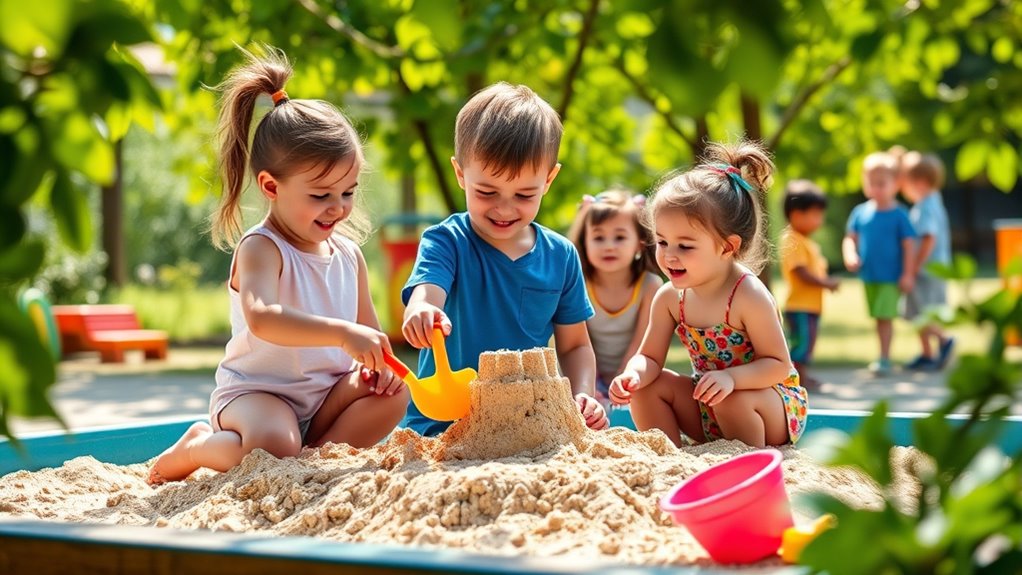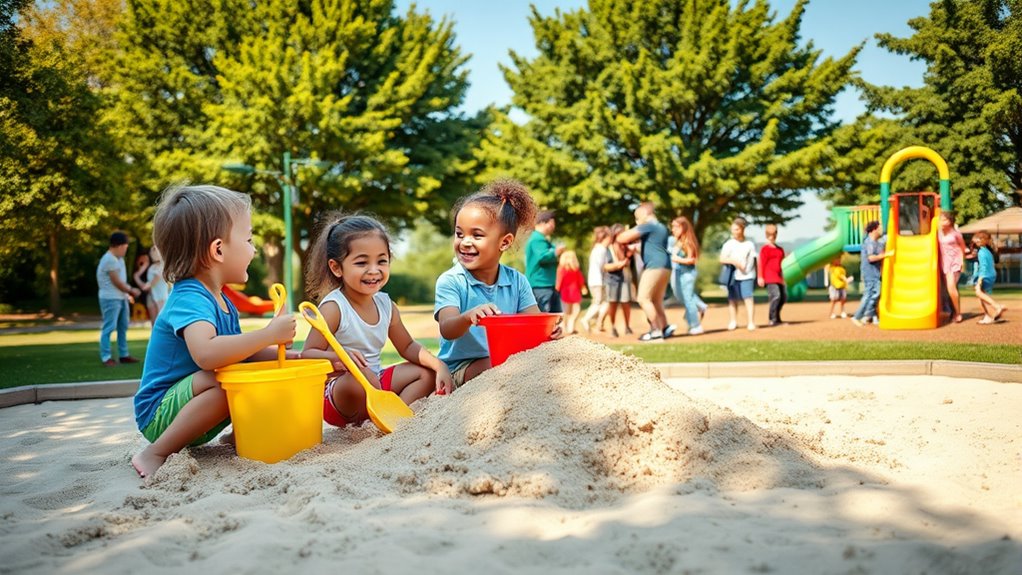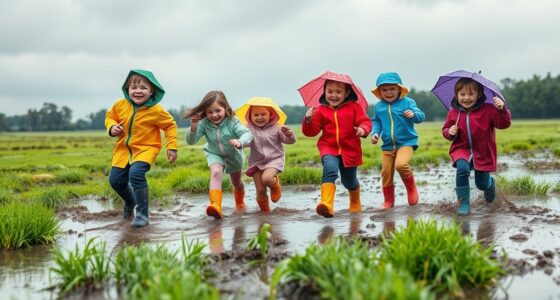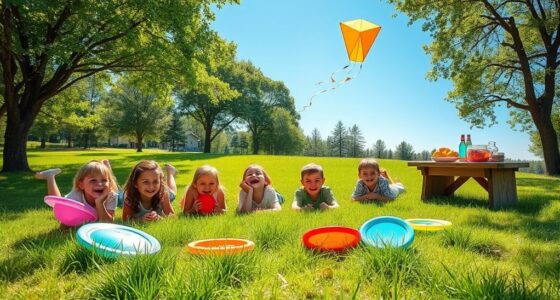In the sandbox, you can help children develop social skills by encouraging sharing tools, taking turns, and resolving conflicts calmly. They learn patience, respect, and effective communication as they navigate playing alongside peers. These interactions promote emotional growth and understanding of social norms, laying a strong foundation for healthy relationships. If you want to discover more ways to support their social development, keep exploring how outdoor play fosters peer connection and teamwork.
Key Takeaways
- Sharing tools teaches patience, respect, and cooperation during outdoor sandbox play.
- Resolving conflicts through communication fosters emotional understanding and social problem-solving skills.
- Turn-taking and waiting promote impulse control and reinforce social norms and politeness.
- Play activities like building sandcastles encourage teamwork and collaborative interaction.
- Outdoor sandbox experiences develop empathy, community awareness, and foundational social skills.

Have you ever wondered how playing in the sandbox can teach kids essential social skills? When your child digs, builds, and interacts with others in the sandbox, they’re not just having fun—they’re developing fundamental skills that will benefit them throughout life. One of the most noticeable lessons is sharing tools. As children reach for the same shovel or bucket, they learn quickly that cooperation means taking turns and using their words to negotiate. Encouraging your child to share tools fosters patience and respect for others’ needs. It’s common for disputes to arise, but these moments are prime opportunities to teach conflict resolution. Instead of stepping in immediately, guide your child to express their feelings calmly, such as saying, “I was using that first,” and suggest solutions like taking turns or sharing.
Sharing tools in the sandbox teaches patience, cooperation, and respectful conflict resolution skills.
In the sandbox, kids often encounter situations where they need to resolve disagreements. These conflicts might involve someone accidentally knocking over a sandcastle or wanting to use the same toy. As you observe, you can help your child navigate these moments by prompting them to communicate their feelings clearly. Encourage phrases like, “Can I have a turn?” or “Let’s build something together,” which promote cooperative problem-solving. When children learn to resolve conflicts on their own, they gain confidence in their social abilities and understand that disagreements are normal and manageable. This process also teaches empathy, as they begin to see things from others’ perspectives and understand the importance of fairness and compromise.
Playing in the sandbox naturally creates situations where children practice patience and turn-taking. When your child waits for their turn or patiently observes others, they’re learning impulse control and respect for shared spaces. These interactions help build their understanding of social norms and how to behave politely in group settings. Additionally, the sandbox environment encourages them to communicate their wants and needs effectively, whether through words or gestures. This enhances their language skills and confidence in social interactions. As they share tools and work through conflicts, they develop a sense of community and belonging, which are fundamental foundations for later social development.
Ultimately, the sandbox isn’t just about making castles or digging holes—it’s a dynamic space for your child to learn important social skills. Sharing tools teaches cooperation, while resolving conflicts helps develop problem-solving abilities and emotional intelligence. These lessons are indispensable, as they lay the groundwork for healthy relationships and positive social interactions as your child grows. By observing and guiding your child during sandbox play, you’re helping them acquire skills that will serve them well far beyond the sandbox—skills that foster empathy, patience, and effective communication. Recognizing that the sandbox environment can also help children develop social skills, including sharing and conflict resolution, underscores its value as a learning space.
Frequently Asked Questions
How Does Outdoor Play Influence Long-Term Social Development?
Outdoor play shapes your child’s long-term social development by fostering peer cooperation and emotional resilience. When kids play outside, they learn to share, negotiate, and work together, building essential social skills. These interactions help them become more emotionally resilient, better handling conflicts and setbacks. As a result, outdoor play creates a strong foundation for healthy relationships and confidence that benefits your child’s social growth throughout life.
What Activities Best Encourage Sharing Among Children in the Sandbox?
To encourage sharing among children in the sandbox, you can introduce sharing strategies like taking turns and dividing toys fairly. Engage them in cooperative games that promote teamwork, such as building a shared sandcastle or creating a group sculpture. These activities help children learn patience and cooperation naturally, making sharing feel like a fun, rewarding experience. Consistent encouragement and modeling positive behaviors reinforce these skills effectively.
How Can Parents Facilitate Positive Peer Interactions During Outdoor Play?
Did you know that children learn conflict resolution skills 80% faster through outdoor play? To facilitate positive peer interactions, encourage cooperative play and model good behavior. When conflicts arise, guide kids to share their feelings and find solutions together. Your active involvement helps children develop essential social skills, like turn-taking and empathy, creating a supportive environment where they can thrive and build lasting friendships during outdoor activities.
Are There Age Differences in Social Skills Gained From Sandbox Activities?
You’ll notice that sandbox maturity influences how kids develop social skills, with older children often better at sharing and cooperation. As they grow, they gain peer recognition, which boosts confidence and encourages positive interactions. Younger children might focus more on exploration, while older ones understand social cues better. By understanding these age differences, you can tailor activities to support each child’s social development and foster meaningful peer connections during outdoor play.
What Are Common Challenges Children Face in Peer Interactions Outdoors?
You might notice children face common challenges like managing conflict resolution and building social confidence during outdoor peer interactions. They often struggle with sharing, taking turns, or resolving disagreements, which can lead to frustration. Encouraging positive communication helps children develop these skills, boosting their confidence. As they practice steering through conflicts, they become more comfortable engaging with peers, fostering healthier and more enjoyable outdoor play experiences.
Conclusion
As you watch children in the sandbox, you see their social skills bloom like vibrant flowers in spring. Each shared toy and friendly laugh plants seeds of trust and cooperation, shaping their future friendships. Outdoor play becomes a gentle breeze that guides their hearts toward understanding and kindness. Remember, every moment in the sandbox is a tiny universe where social skills grow and flourish, creating a colorful mosaic of connection that lasts a lifetime.










